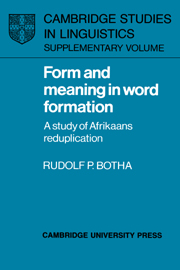3 - Semantic interpretation
Published online by Cambridge University Press: 27 February 2010
Summary
Outline
As was noted in Chapter 1 above, Afrikaans reduplications are held in conventional analyses to be highly complex from the semantic point of view. That is, they are held to express a large set of often diverse “meanings” even though they are all built on a single formal pattern. Accordingly the process of Afrikaans reduplication is likewise taken to be a phenomenon of great semantic complexity. The present analysis, however, will claim that this semantic complexity is apparent rather than real and that all Afrikaans reduplications undergo one and the same semantic interpretation rule, namely (1).
(1) Interpret [∝i∝i] as [A INCREASED]
(where A represents the sense or meaning of ∝ and INCREASED represents an abstract semantic unit)
With the specifics of the interpretation rule (1) I will deal below. All that needs to be noted at this point is that rule (1), formulated in the spirit of the Galilean style, is strongly unifying in that it applies to all reduplications. And it is quite simple as well. The central question to be answered is how so simple a rule is able to account for the diversity in and specificity of the meanings conventionally attributed to Afrikaans reduplications. It is to this question that the present chapter will address itself.
The general thesis that will be argued is that both the diversity of the meanings associated with Afrikaans reduplications and the specificity of these meanings are a function of the interaction between the interpretation rule (1) and semantic and or general conceptual devices that are independent of it.
Information
- Type
- Chapter
- Information
- Form and Meaning in Word FormationA Study of Afrikaans Reduplication, pp. 91 - 152Publisher: Cambridge University PressPrint publication year: 1988
